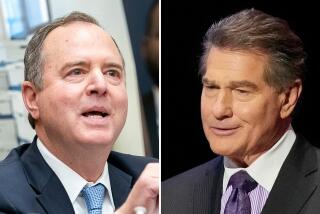Crisis Making Politicians Run on Issues of the Past
- Share via
EAST LANSING, Mich. — When Democratic Sen. Carl Levin debated Republican Rep. Bill Schuette, his reelection opponent, here last week, virtually the only subject on which they agreed was President Bush’s decision to send troops to Saudi Arabia.
No big surprise there. But what was notable was what they did argue about--energy policy and defense spending--subjects that were politically comatose until Iraq invaded Kuwait last month. By contrast, the two candidates brushed past abortion and the environment--two issues originally expected to burn brightly this fall. And the constitutionality of flag-burning--a question that ignited passions only three months ago--never came up.
As in Michigan, candidates across the country are aggressively employing the developments in the Mideast to sharpen their differences, even when they agree on the deployment itself. In the process, the Persian Gulf crisis is reviving partisan disputes that were more common when Jimmy Carter sat in the Oval Office.
In Illinois, GOP Rep. Lynn Martin has slammed Sen. Paul Simon for supporting large cuts in the defense budget--a position that appeared politically unassailable only weeks ago. In Kentucky, Democratic challenger Harvey Sloane and Republican Sen. Mitch McConnell have ripped each other for financial ties to the oil industry, whose standing as a political demon had shrunk along with oil prices in the mid-1980s. “The oil companies have become worse than the savings and loans,” Democratic pollster Celinda Lake said.
In Michigan, where these themes have converged, the Senate contest has taken on overtones of a political race back to the future. Both candidates have aggressively employed the new circumstances to reinforce their long-standing appeals.
Schuette, 36, an attractive and energetic three-term representative from the north central part of the state, faces an uphill battle to unseat Levin, 56, a shrewd and rumpled graduate of gritty Detroit politics who was first elected to the Senate in 1978. Levin leads Schuette by more than 2 to 1, according to a Detroit News poll released this week.
Throughout the campaign, Schuette has been relying heavily on the polarizing “wedge” issues that Bush used in 1988 to portray Democrat Michael S. Dukakis as an elitist liberal ideologue. Since early this spring, Schuette has persistently attacked Levin for opposition to the death penalty, uncertainty on flag-burning and for refusing to rule out new taxes, hoping to convince voters that “Levin is a man who stands 180 degrees from the beliefs and values of the mainstream of Michigan.”
That case has been difficult to make against Levin, whose affable frumpiness effectively armors him against accusations of trendy elitism. And, with the Soviet threat imploding, Schuette was denied one of Bush’s sharpest wedges--national defense.
But, with the emergence of the new threat in the gulf, Schuette, like Martin and other GOP challengers, has nimbly resuscitated the traditional Republican complaint that Democrats are dangerously soft on defense. At last week’s debate, Schuette repeatedly hammered Levin for not supporting the military buildup pursued by Ronald Reagan and Bush. Although Levin has endorsed the President’s moves in the Mideast, Schuette charged, he “never gives us the means for a strong national defense.”
Schuette may have found a potent symbol for his case when he criticized the senator for standing on the deck of the battleship Wisconsin during an early September tour through the combat zone, although Levin had voted against recommissioning the ship in 1985.
Levin is not totally defenseless against the charge of being soft on national security. As chairman of the Senate Armed Services subcommittee on conventional forces, he frequently notes, he has supported shifting resources from nuclear to conventional weapons--the relevant measure of strength in the Persian Gulf.
Nevertheless, few Democratic strategists had hoped to spend the fall debating military preparedness. To the extent that the agenda has shifted from cutting defense spending to ensuring America’s security against unanticipated threats, “it has taken the argument away from the Democrats,” said Republican pollster Alex Gage, who is advising Schuette.
But, if the crisis has freed Republicans to strike old poses on national defense, it has also enabled Democrats to dust off their invective against Big Oil.
For Levin, that presents an opportunity to underscore his basic campaign theme. While Schuette has tried to polarize the race around cultural issues, Levin, like many Democrats this year, has sought to divide the electorate on economic grounds.
To cement his links with swing blue-collar voters--conservative on social issues but suspicious of the wealthy and big business--Levin has stressed such populist issues as trade and tax “fairness.” Now, the rise in gasoline prices has presented him with perhaps his most compelling populist villain.
In last week’s debate, Schuette proposed to ease the energy price rise by offering domestic oil companies more incentives to drill for new supplies--in effect arguing that the proper response to soaring prices is tax breaks. But Levin swung for the gut, declaring that “we ought to sock it to the oil companies in every way we possibly can. They’re gouging the heck out of us. We . . . ought to have a windfall profits tax on their excess profits.”
Few here doubt that Levin won that exchange. “The farmers are bitching about (oil prices), the bankers are bitching about it, working folks don’t understand it,” said state Rep. Bob Emerson (D-Flint). “Everybody’s mad at the oil companies.”
The Mideast crisis has also intensified fears of an imminent recession in the state, where slipping car sales had induced jitters even before the invasion.
That economic anxiety represents the wild card in this race, as in many others around the nation. Republicans hope it will strengthen their anti-tax and time-for-a-change arguments. Schuette has already put Levin on the defensive for previously endorsing an oil import fee and has pledged not to support any budget agreement that includes new taxes. If such an agreement is reached before Election Day, and Levin votes for new taxes, “all of a sudden, it would be a close race,” said Republican consultant Tom Shields.
But, short of such a dramatic development, most Michigan analysts feel that voters here will do what they usually do when they feel a cold economic gale gathering: lean toward Democrats who promise them shelter against hard times. Of all the political winds now blowing from the Persian Gulf, that may prove the most powerful.
More to Read
Get the L.A. Times Politics newsletter
Deeply reported insights into legislation, politics and policy from Sacramento, Washington and beyond. In your inbox twice per week.
You may occasionally receive promotional content from the Los Angeles Times.









